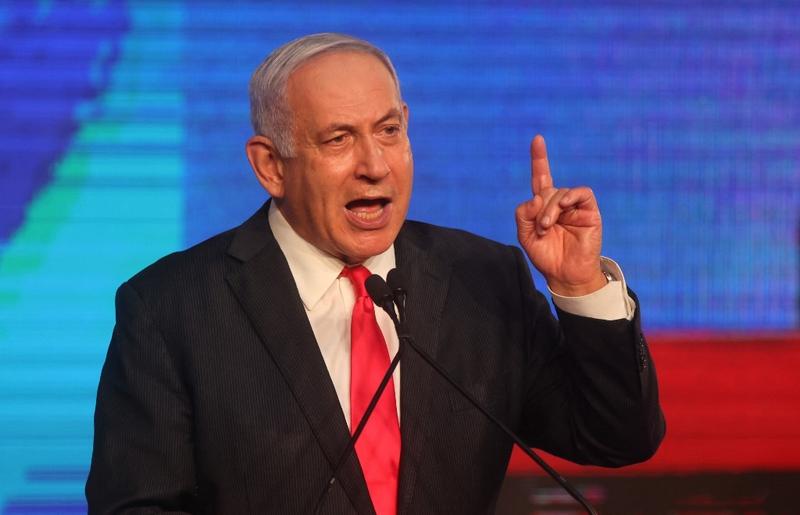 In this file photo taken on March 24, 2021, Israeli Prime Minister Benjamin Netanyahu, leader of the Likud party, addresses supporters at the party campaign headquarters in Jerusalem after the end of voting in the fourth national election in two years. (EMMANUEL DUNAND / AFP)
In this file photo taken on March 24, 2021, Israeli Prime Minister Benjamin Netanyahu, leader of the Likud party, addresses supporters at the party campaign headquarters in Jerusalem after the end of voting in the fourth national election in two years. (EMMANUEL DUNAND / AFP)
JERUSALEM - Israeli Prime Minister Benjamin Netanyahu got a new lease on his political life on Tuesday, receiving a mandate from Israel’s president to form a new government after an inconclusive election.
Benjamin Netanyahu, Israel’s longest-serving leader, now has 28 days, with the possibility of a two-week extension, to break an unprecedented political stalemate and enlist enough allies for a governing coalition
Israel’s longest-serving leader, in power consecutively since 2009, now faces the tough task of breaking an unprecedented political stalemate and enlisting enough allies for a governing coalition.
Under law, Netanyahu will have 28 days to do so, with the possibility of a two-week extension before President Reuven Rivlin picks another candidate or asks parliament to choose one.
Israel’s election on March 23, its fourth in two years, ended with neither a Netanyahu-led right-wing and religious bloc nor a prospective alliance of his opponents winning a parliamentary majority.
But in consultations Rivlin held with political parties on Monday on granting the coalition-building mandate, Netanyahu received more endorsements than his challengers, leading to the president’s televised announcement giving him the nod.
ALSO READ: Israel polls: Why an Arab Israeli is the nation's key figure now
Netanyahu received the recommendations of 52 lawmakers in the 120-member Knesset. Centrist politician and ex-Finance Minister Yair Lapid of the Yesh Atid party gleaned 45 endorsements and former Defense Minister Naftali Bennett of the far-right Yamina party got seven.
Three parties, with a total of 16 parliamentary seats, declined in their meetings with Rivlin to nominate any candidate.
 Israeli President Reuven Rivlin (center) speaks with Israeli Arab politician, leader of the United Arab list, Mansour Abbas (2nd right) as they discuss who might form the next coalition government, at the president's residence in Jerusalem, April 5, 2021. (ABIR SULTAN / POOL PHOTO VIA AP)
Israeli President Reuven Rivlin (center) speaks with Israeli Arab politician, leader of the United Arab list, Mansour Abbas (2nd right) as they discuss who might form the next coalition government, at the president's residence in Jerusalem, April 5, 2021. (ABIR SULTAN / POOL PHOTO VIA AP)
Netanyahu has urged Bennett and another former ally, Gideon Saar, who founded the right-wing New Horizon party after leaving the prime minister’s conservative Likud, to join him to break the deadlock.
Bennett has been non-committal about teaming up again with Netanyahu, with whom he has had a rocky relationship.
Saar has said he would not serve under Netanyahu, citing the prime minister’s corruption trial - which opened on Monday - but stopped short of endorsing Lapid.
Netanyahu, who has denied any criminal wrongdoing, attended part of the court session and later repeated accusations that the prosecution’s case was “an attempted coup” aimed at ousting a “strong, right-wing prime minister”.
With Rivlin’s decision pending, Lapid said on Monday he had proposed a coalition deal to Bennett. Under the arrangement, Bennett would serve first as prime minister and then Lapid would take over.
“The Israeli public needs to see that its leaders can work together,” Lapid said in a televised address.
READ MORE: Final results in Israel's elections show political deadlock
Bennett made no immediate comment about Lapid’s offer. Political commentators said such a deal might also pave the way for right-winger Saar to join Lapid, with the prospect of Bennett, a fellow conservative, at the helm.


